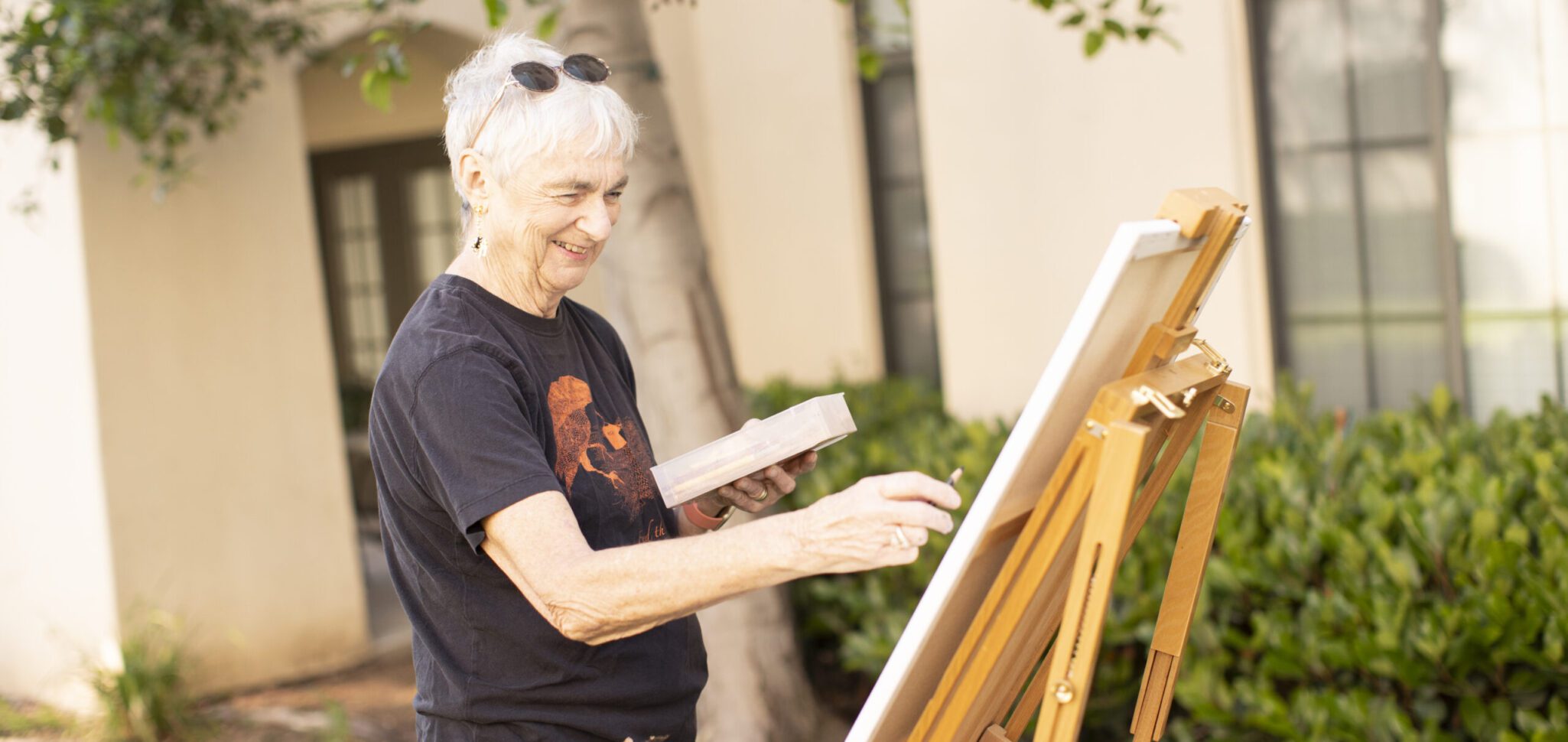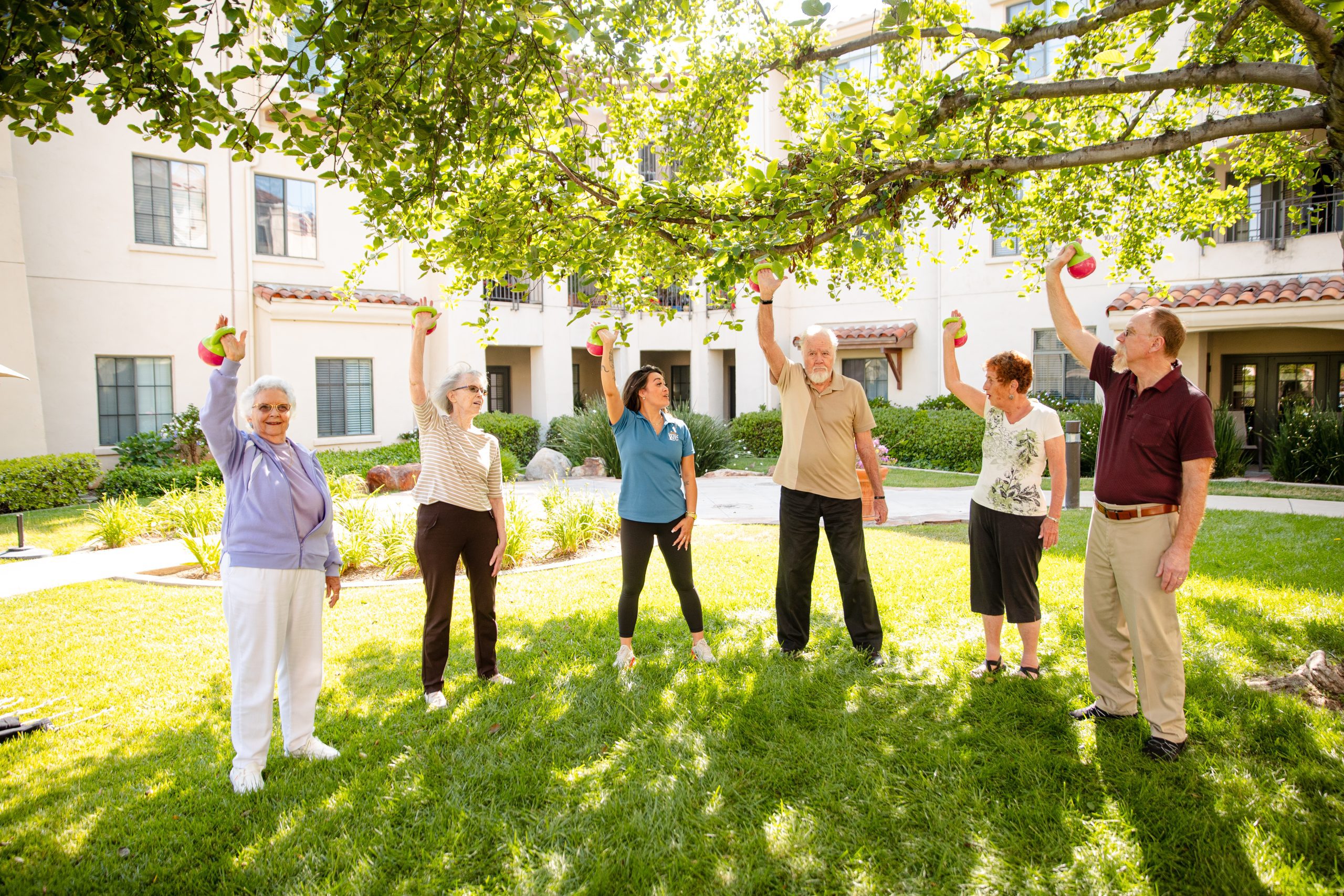Pursuing Interests & Hobbies as Older Adults

According to a recent Gallup poll, 59% of people aged 55 and older rate their hobbies as extremely or very important to them. As this statistic indicates, hobbies and recreational activities have become integral to retirement for many older adults. These exciting pastimes keep seniors busy and engaged with their communities as they age.
Hobbies for older adults take many forms. Some people enjoy working up a sweat with vigorous physical activities like biking, hot yoga, and hiking. Others express themselves artistically through photography, painting, sculpting, and knitting. Seniors can also explore cultural interests by attending musical performances, visiting art museums, or learning a new language.
The options are limitless, so every older adult can find plenty of enriching activities to suit their needs. Joining a senior living community offers even more opportunities to enjoy the numerous advantages of hobbies.
What Are the Benefits of Hobbies and Interests for Older Adults?
People often think of activities like reading a book or playing the piano as nothing more than fun ways to pass the time. However, there are numerous benefits of hobbies for older people, including:
- Greater resilience when faced with obstacles and change
- Increased lifespan
- Improved memory
- Decreased risk of depression and cognitive diseases like dementia
- Reduced risk of developing physical ailments, such as heart disease, stroke, and certain types of cancer
- Lower levels of stress
Hobbies for seniors also enhance overall well-being by allowing older adults to enjoy more fulfilling lives. For instance, some people may give back to their communities by volunteering at a local food bank or elementary school. Others may find personal fulfillment in achieving goals and perfecting new skills, such as advanced watercolor painting techniques or cooking methods. These meaningful hobbies increase happiness and engagement.
Exploring Your Hobbies and Interests as an Older Adult
Retirement is the perfect time to discover new hobbies and reignite old passions. Many older adults have more free time and resources to devote to the activities that make them feel happy and fulfilled.
You can start exploring hobbies by considering your interests. Think about the topics and activities that make you feel curious or excited. For example, you might enjoy birdwatching or volunteering at a local animal shelter if you love animals. If you love doodling, try painting or sketching.
You may also find it helpful to choose several types of hobbies. That way, you can rotate between activities based on your mood and goals.
Popular categories of hobbies include:
- Creative arts: These activities exercise your brain and let you use your imagination. Try calligraphy, creative writing, pottery, or jewelry making.
- Intellectual pursuits: Expand your knowledge and learn new skills with intellectual hobbies. You can engage in stimulating activities like attending book clubs, playing chess, and solving crossword puzzles.
- Physical activities: Get your heart pumping and stay in shape with fun exercises. Popular physical hobbies include yoga, swimming, and tennis.
- Culinary arts: Enjoy delicious foods and discover new flavors by cooking new recipes, going to wine tastings, and sampling a variety of cuisines.
Choosing diverse hobbies will help you stay mentally and physically active and increase your overall quality of life as you age.
Growth and Personal Fulfillment
Leisure activities can significantly enrich your body, mind, and spirit. These pursuits promote personal growth and fulfillment by allowing you to challenge yourself and learn new skills. For example, you can perfect your cake decorating skills by taking cooking classes or prepare for a trip abroad by studying French. As you gain knowledge, you’ll develop more self-confidence and learn to adapt to new challenges.
Hobbies also allow you to set goals and continually pursue self-improvement. If you’re passionate about working in the community garden, you might start small by planting a handful of flowers and vegetables. As your skills develop, you can make goals to add more challenging plants and test out new gardening techniques to help your plants thrive.
As you reflect on your development, you can take pride in your accomplishments and nurture a sense of purpose. These activities will allow you to flourish and ensure your retirement is exciting.
Fostering Connections and Friendships
Hobbies are one of the best ways to build and nurture a strong social network as you age. These pursuits allow you to connect with peers with similar passions, knowledge, and goals. If you enjoy running and want to complete a 5K, finding a workout buddy with similar aspirations can give you the encouragement and motivation to lace up your running shoes every morning.
It may also be helpful to join groups that fit your personal interests. Many retirement communities have thriving groups or clubs that welcome new members. For example, you could hit the trails with a hiking group or immerse yourself in classic literature by joining a book club. These groups can help you discover new aspects of your hobby and learn from people with similar passions.
Hobbies can also lead to lifelong friendships and instill a greater sense of belonging in the community. You might meet a lively circle of friends at a wine tasting and start attending regular cooking events with them. Or you could bond with a new birdwatching friend as you discover species on walks around the community. These relationships help you develop a robust support system and prevent feelings of social isolation and loneliness, which can severely affect seniors’ health.
Seizing Opportunities With Senior Living Communities
Many people assume that only very old or ill adults need to move into senior living communities. However, these communities provide vibrant environments with plenty of amenities and features that enhance the quality of life for older adults of all ages. As a result, making the transition early in your retirement can help you increase fulfillment and maximize the time you spend on your hobbies and focusing on yourself.
The benefits of moving into a senior living community include:
More Free Time for Recreation
SRG Senior Living communities provide a maintenance-free lifestyle for residents. Team members handle tedious and time-consuming chores like cleaning, laundry, and lawn mowing. These services drastically reduce stress and allow you to spend more time on the things you want to do, instead of have to do. Instead of washing dishes and mopping, you can fill your days with art, crafting, tennis, volunteering, and other meaningful hobbies.
Dedicated Spaces for Hobbies
Senior living communities often provide spaces and resources for hobbies and recreational activities. You can stop by the community gym for swimming, hot yoga, or meditation sessions. Additionally, spaces like clubhouses and movie theaters can host social events, such as book clubs, classic movie nights, and art workshops.
Many communities also lend out equipment for hobbies. For instance, you can borrow a bike or visit the art room to gather supplies. These amenities ensure you have everything you need to pursue your hobbies whenever the spirit moves you.
Workshops and Classes
You can discover new hobbies or pursue existing passions by attending on-site classes and workshops. Popular offerings include art seminars, cooking classes, and woodworking workshops. These events let you connect with peers with shared interests and learn from experienced instructors. You can also develop new skills and stimulate your mind.
Pursue New Passions With Senior Living
Joining a senior living community gives you the time, space, and resources to invest in your hobbies and interests. You can enjoy a variety of amenities, such as crafting classes and state-of-the-art fitness facilities. Older adults who choose to live outside of a community often don’t have access to these resources, so moving to senior living can help you take your hobbies to the next level.
Contact SRG Senior Living to learn how we can support your hobbies and help you embrace a meaningful, engaging lifestyle.




